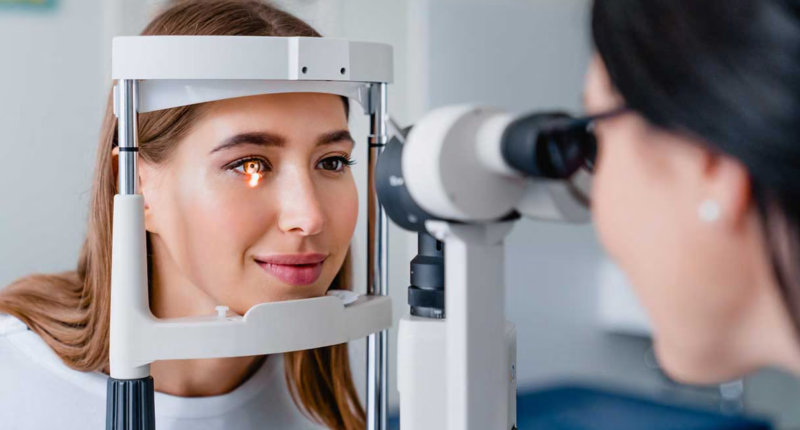When it comes to health, the eyes are often overlooked. Most people think of eye exams as a way to update their prescription glasses or contact lenses. However, regular eye exams go far beyond vision correction. They play a crucial role in identifying early signs of various health issues that might otherwise go unnoticed. Here’s why making eye exams a priority is essential for your overall well-being.
- Early Detection of Eye Diseases
Regular eye exams are critical for detecting eye diseases in their early stages. Conditions like glaucoma, macular degeneration, and cataracts often develop slowly and may not present noticeable symptoms until significant damage has occurred. A comprehensive eye exam can uncover these problems early when they are easier to treat and manage.
- Glaucoma: Often referred to as the “silent thief of sight,” glaucoma can lead to permanent damage if left untreated. Eye exams measure intraocular pressure and examine the optic nerve to catch it early.
- Macular Degeneration: This age-related condition can severely affect central vision. Regular eye checks can help spot early signs and slow progression.
- Cataracts: An eye exam can identify clouding in the lens, allowing for timely treatment to restore clarity.
- Identifying Systemic Health Conditions
Your eyes can reveal much more than your ability to see. Optometrists and ophthalmologists often identify systemic health conditions during routine exams. These include:
- Diabetes: Diabetic retinopathy is a complication arising from diabetes that harms the blood vessels in the retina. An eye exam can detect this even before you notice symptoms, prompting early medical intervention.
- Hypertension: High blood pressure can cause changes in the blood vessels of the eyes, such as narrowing or bleeding. These signs can indicate a need for immediate treatment to prevent serious complications.
- Cholesterol: Yellowish deposits around the eyes or changes in the retina may signal high cholesterol levels, increasing your risk of cardiovascular disease.
- Spotting Autoimmune Disorders
Autoimmune diseases, such as lupus or multiple sclerosis, can manifest in the eyes. Inflammation of the optic nerve, dry eyes, or other visual changes may point to underlying autoimmune conditions. Regular eye exams can provide early clues, leading to a quicker diagnosis and better management of these diseases.
- Uncovering Neurological Problems
The health of your eyes is closely linked to your brain. Eye exams can detect neurological problems that affect vision, such as:
- Brain Tumors: Swelling of the optic nerve, known as papilledema, may be a sign of increased pressure in the brain due to a tumour or other issues.
- Stroke: Vision loss or visual field changes can sometimes indicate a stroke. Eye exams can help identify these problems early.
- Multiple Sclerosis: Optic neuritis, an inflammation of the optic nerve, is often an early symptom of multiple sclerosis.
- Supporting Children’s Development
For children, regular eye exams are vital for healthy development. Poor vision can hinder learning and social interaction. Eye exams can detect conditions like amblyopia (lazy eye) or strabismus (crossed eyes) early, ensuring timely treatment and better outcomes.
- Maintaining Overall Quality of Life
Good vision significantly impacts your daily life. By addressing eye problems early, you can maintain your independence, enjoy hobbies, and reduce the risk of accidents. For older adults, regular eye exams can help prevent falls and improve overall safety.
How Often Should You Get an Eye Exam?

The frequency of eye exams depends on your age, health, and risk factors:
- Children: First exam at six months, again at age three, and before starting school. Afterward, every one to two years.
- Adults (18-60): At least every two years, or annually if you wear glasses or contacts.
- Seniors (60+): Annual eye exams are recommended to monitor age-related changes.
- At-Risk Individuals: If you have diabetes, high blood pressure, or a family history of eye disease, more frequent exams may be necessary.
Tips for Keeping Your Eyes Healthy
While regular eye exams are vital, adopting healthy habits can further protect your vision:
- Eat a Balanced Diet: Foods rich in omega-3 fatty acids, lutein, and vitamin A support eye health.
- Wear UV Protection: Sunglasses that block UVA and UVB rays can prevent sun damage.
- Take Screen Breaks: Follow the 20-20-20 rule—look at something 20 feet away for 20 seconds every 20 minutes.
- Stay Hydrated: Proper hydration reduces dry eye symptoms.
- Quit Smoking: Smoking raises the likelihood of developing eye diseases, including cataracts and macular degeneration.
Conclusion
Your eyes are a window to your overall health. Regular eye exams not only protect your vision but also provide critical insights into other health conditions. By prioritizing these exams and adopting healthy habits, you can safeguard your eyes and detect potential health issues early. Don’t wait for symptoms to appear—schedule your next eye exam today and take a proactive step toward better health.









